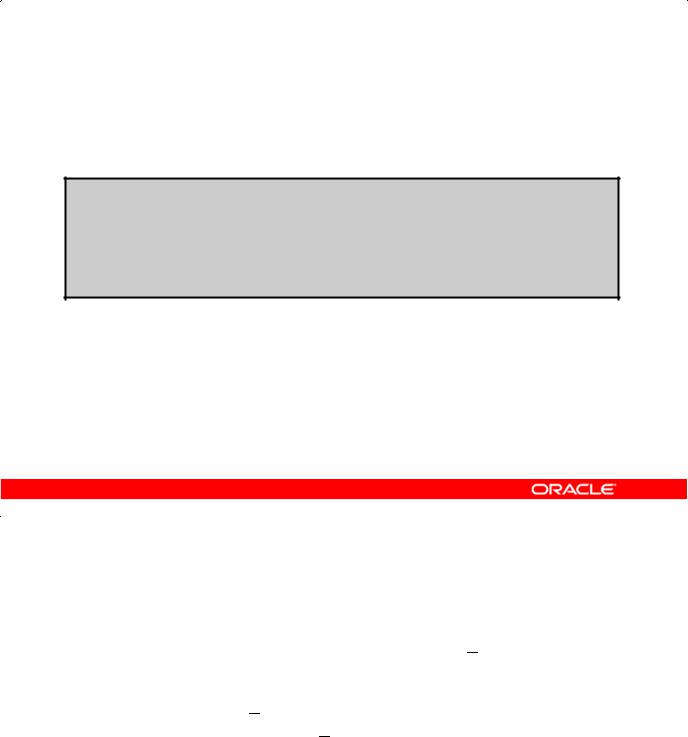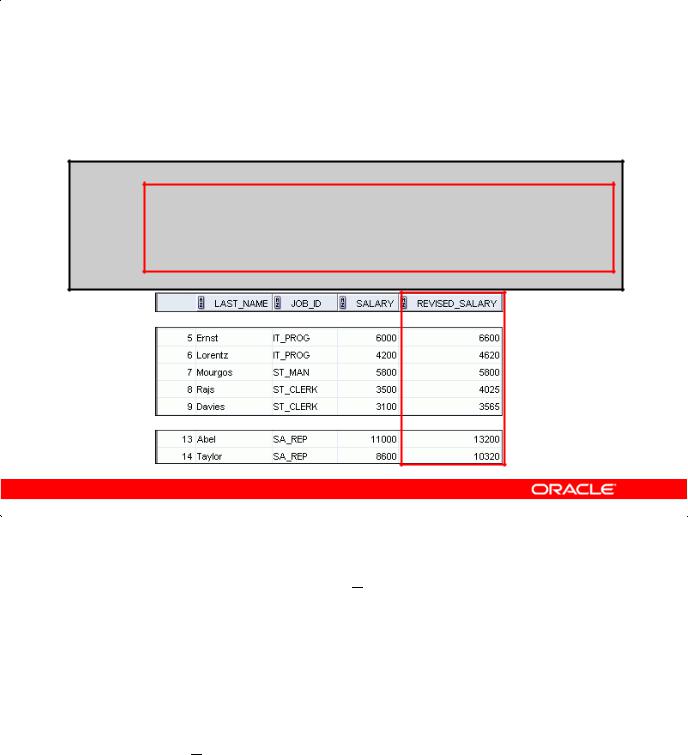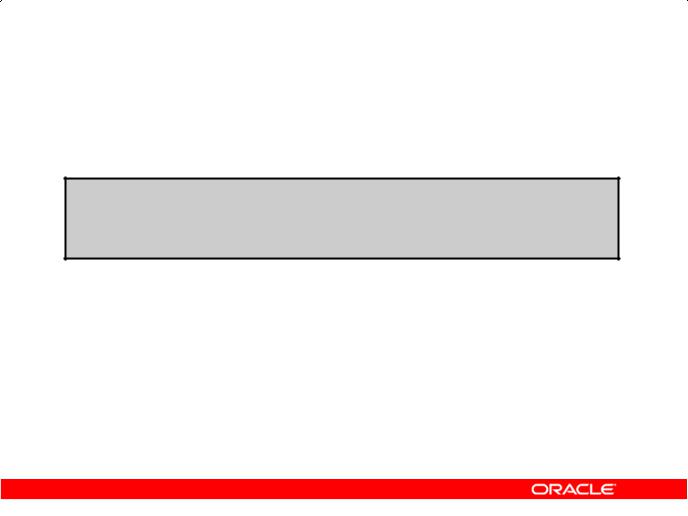
- •Preface
- •Introduction
- •Lesson Objectives
- •Lesson Agenda
- •Course Objectives
- •Course Agenda
- •Appendixes Used in the Course
- •Lesson Agenda
- •Oracle Database 11g: Focus Areas
- •Oracle Database 11g
- •Oracle Fusion Middleware
- •Oracle Enterprise Manager Grid Control 10g
- •Oracle BI Publisher
- •Lesson Agenda
- •Relational and Object Relational Database Management Systems
- •Data Storage on Different Media
- •Relational Database Concept
- •Definition of a Relational Database
- •Data Models
- •Entity Relationship Model
- •Relating Multiple Tables
- •Relational Database Terminology
- •Lesson Agenda
- •Using SQL to Query Your Database
- •SQL Statements
- •Development Environments for SQL
- •Lesson Agenda
- •The Human Resources (HR) Schema
- •Tables Used in the Course
- •Lesson Agenda
- •Oracle Database 11g Documentation
- •Additional Resources
- •Summary
- •Practice I: Overview
- •Objectives
- •Lesson Agenda
- •Capabilities of SQL SELECT Statements
- •Basic SELECT Statement
- •Selecting All Columns
- •Selecting Specific Columns
- •Writing SQL Statements
- •Column Heading Defaults
- •Lesson Agenda
- •Arithmetic Expressions
- •Using Arithmetic Operators
- •Operator Precedence
- •Defining a Null Value
- •Null Values in Arithmetic Expressions
- •Lesson Agenda
- •Defining a Column Alias
- •Using Column Aliases
- •Lesson Agenda
- •Concatenation Operator
- •Literal Character Strings
- •Using Literal Character Strings
- •Alternative Quote (q) Operator
- •Duplicate Rows
- •Lesson Agenda
- •Displaying the Table Structure
- •Using the DESCRIBE Command
- •Quiz
- •Summary
- •Practice 1: Overview
- •Objectives
- •Lesson Agenda
- •Limiting Rows Using a Selection
- •Limiting the Rows That Are Selected
- •Using the WHERE Clause
- •Character Strings and Dates
- •Comparison Operators
- •Using Comparison Operators
- •Range Conditions Using the BETWEEN Operator
- •Membership Condition Using the IN Operator
- •Pattern Matching Using the LIKE Operator
- •Combining Wildcard Characters
- •Using the NULL Conditions
- •Defining Conditions Using the Logical Operators
- •Using the AND Operator
- •Using the OR Operator
- •Using the NOT Operator
- •Lesson Agenda
- •Rules of Precedence
- •Lesson Agenda
- •Using the ORDER BY Clause
- •Sorting
- •Lesson Agenda
- •Substitution Variables
- •Using the Single-Ampersand Substitution Variable
- •Character and Date Values with Substitution Variables
- •Specifying Column Names, Expressions, and Text
- •Using the Double-Ampersand Substitution Variable
- •Lesson Agenda
- •Using the DEFINE Command
- •Using the VERIFY Command
- •Quiz
- •Summary
- •Practice 2: Overview
- •Objectives
- •Lesson Agenda
- •SQL Functions
- •Two Types of SQL Functions
- •Single-Row Functions
- •Lesson Agenda
- •Character Functions
- •Case-Conversion Functions
- •Using Case-Conversion Functions
- •Character-Manipulation Functions
- •Using the Character-Manipulation Functions
- •Lesson Agenda
- •Number Functions
- •Using the ROUND Function
- •Using the TRUNC Function
- •Using the MOD Function
- •Lesson Agenda
- •Working with Dates
- •RR Date Format
- •Using the SYSDATE Function
- •Arithmetic with Dates
- •Using Arithmetic Operators with Dates
- •Lesson Agenda
- •Date-Manipulation Functions
- •Using Date Functions
- •Using ROUND and TRUNC Functions with Dates
- •Quiz
- •Summary
- •Practice 3: Overview
- •Objectives
- •Lesson Agenda
- •Conversion Functions
- •Implicit Data Type Conversion
- •Explicit Data Type Conversion
- •Lesson Agenda
- •Using the TO_CHAR Function with Dates
- •Elements of the Date Format Model
- •Using the TO_CHAR Function with Dates
- •Using the TO_CHAR Function with Numbers
- •Using the TO_NUMBER and TO_DATE Functions
- •Using the TO_CHAR and TO_DATE Function with RR Date Format
- •Lesson Agenda
- •Nesting Functions
- •Lesson Agenda
- •General Functions
- •NVL Function
- •Using the NVL Function
- •Using the NVL2 Function
- •Using the NULLIF Function
- •Using the COALESCE Function
- •Lesson Agenda
- •Conditional Expressions
- •CASE Expression
- •Using the CASE Expression
- •DECODE Function
- •Using the DECODE Function
- •Quiz
- •Summary
- •Practice 4: Overview
- •Objectives
- •Lesson Agenda
- •What Are Group Functions?
- •Types of Group Functions
- •Group Functions: Syntax
- •Using the AVG and SUM Functions
- •Using the MIN and MAX Functions
- •Using the COUNT Function
- •Using the DISTINCT Keyword
- •Group Functions and Null Values
- •Lesson Agenda
- •Creating Groups of Data
- •Creating Groups of Data: GROUP BY Clause Syntax
- •Using the GROUP BY Clause
- •Grouping by More than One Column
- •Using the GROUP BY Clause on Multiple Columns
- •Illegal Queries Using Group Functions
- •Restricting Group Results
- •Restricting Group Results with the HAVING Clause
- •Using the HAVING Clause
- •Lesson Agenda
- •Nesting Group Functions
- •Quiz
- •Summary
- •Practice 5: Overview
- •Objectives
- •Lesson Agenda
- •Types of Joins
- •Joining Tables Using SQL:1999 Syntax
- •Qualifying Ambiguous Column Names
- •Lesson Agenda
- •Creating Natural Joins
- •Retrieving Records with Natural Joins
- •Creating Joins with the USING Clause
- •Joining Column Names
- •Retrieving Records with the USING Clause
- •Using Table Aliases with the USING Clause
- •Creating Joins with the ON Clause
- •Retrieving Records with the ON Clause
- •Creating Three-Way Joins with the ON Clause
- •Applying Additional Conditions to a Join
- •Lesson Agenda
- •Joining a Table to Itself
- •Self-Joins Using the ON Clause
- •Lesson Agenda
- •Nonequijoins
- •Retrieving Records with Nonequijoins
- •Lesson Agenda
- •INNER Versus OUTER Joins
- •LEFT OUTER JOIN
- •RIGHT OUTER JOIN
- •FULL OUTER JOIN
- •Lesson Agenda
- •Cartesian Products
- •Generating a Cartesian Product
- •Creating Cross Joins
- •Quiz
- •Summary
- •Practice 6: Overview
- •Objectives
- •Lesson Agenda
- •Using a Subquery to Solve a Problem
- •Subquery Syntax
- •Using a Subquery
- •Guidelines for Using Subqueries
- •Types of Subqueries
- •Lesson Agenda
- •Single-Row Subqueries
- •Executing Single-Row Subqueries
- •Using Group Functions in a Subquery
- •The HAVING Clause with Subqueries
- •What Is Wrong with This Statement?
- •No Rows Returned by the Inner Query
- •Lesson Agenda
- •Multiple-Row Subqueries
- •Lesson Agenda
- •Null Values in a Subquery
- •Quiz
- •Summary
- •Practice 7: Overview
- •Objectives
- •Lesson Agenda
- •Set Operators
- •Set Operator Guidelines
- •The Oracle Server and Set Operators
- •Lesson Agenda
- •Tables Used in This Lesson
- •Lesson Agenda
- •UNION Operator
- •Using the UNION Operator
- •UNION ALL Operator
- •Using the UNION ALL Operator
- •Lesson Agenda
- •INTERSECT Operator
- •Using the INTERSECT Operator
- •Lesson Agenda
- •MINUS Operator
- •Using the MINUS Operator
- •Lesson Agenda
- •Matching the SELECT Statements
- •Matching the SELECT Statement: Example
- •Lesson Agenda
- •Using the ORDER BY Clause in Set Operations
- •Quiz
- •Summary
- •Practice 8: Overview

Conditional Expressions
•Provide the use of the IF-THEN-ELSE logic within a SQL statement
•Use two methods:
–CASE expression
–DECODE function
|
Copyright © 2009, Oracle. All rights reserved. |
Academy |
|
Conditional Expressions |
|
|
|
|
Oracle |
||
The two methods that are used to implement conditional processing (IF-THEN-ELSE logic) in a |
|||
SQL statement are the CASE expression and the DECODE fun tion. |
|
||
Note: The CASE expression complies with the ANSI SQL. The DECODE function is specific to |
|||
Oracle syntax. |
|
Only |
|
|
& |
|
|
Internal |
|
|
|
Oracle |
Use |
|
|
|
|
|
|
Oracle Database 11g: SQL Fundamentals I 4 - 36

CASE Expression
Facilitates conditional inquiries by doing the work of an
IF-THEN-ELSE statement:
CASE expr WHEN comparison_expr1 THEN return_expr1
[WHEN comparison_expr2 THEN return_expr2
WHEN comparison_exprn THEN return_exprn
ELSE else_expr]
Copyright © 2009, Oracle. All rights reserved.
CASE Expression |
Academy |
|
CASE expressions allow you to use the IF-THEN-ELSE logic in SQL statements without having to |
|
invoke procedures. |
Oracle |
|
|
In a simple CASE expression, the Oracle server searches for the first WHEN ... THEN pair for |
|
which expr is equal to comparison_expr and returns return expr. If none of the WHEN |
|
|
Only |
... THEN pairs meet this condition, and if an ELSE clause exists, then the Oracle server returns |
|
else_expr. Otherwise, the Oracle server&returns a null. You cannot specify the literal NULL for all |
|
Internal |
|
the return_exprs and the else expr. |
|
Use |
|
All of the expressions ( expr, comparison xpr, and return_expr) must be of the same |
|
data type, which can be CHAR, VARCHAR2, NCHAR, or NVARCHAR2. |
|
Oracle |
|
Oracle Database 11g: SQL Fundamentals I 4 - 37

Using the CASE Expression
Facilitates conditional inquiries by doing the work of an
IF-THEN-ELSE statement:
SELECT last_name, job_id, salary,
CASE job_id WHEN |
'IT_PROG' THEN 1.10*salary |
|||
|
WHEN |
'ST_CLERK' THEN |
1.15*salary |
|
|
WHEN |
'SA_REP' |
THEN |
1.20*salary |
ELSE |
salary |
END |
"REVISED_SALARY" |
|
FROM employees;
…
…
…
Copyright © 2009, Oracle. All rights reserved.
Using the CASE Expression |
Academy |
|
|
|
|
In the SQL statement in the slide, the value of JOB ID is decod d. If JOB_ID is IT_PROG, the |
||
salary increase is 10%; if JOB_ID is ST_CLERK, the salary in rease is 15%; if JOB_ID is |
||
SA_REP, the salary increase is 20%. For all other job oles, there is no increase in salary. |
||
The same statement can be written with the DEC DE function. |
|
|
|
Oracle |
|
The following code is an example of the searched CASE expression. In a searched CASE expression, |
||
|
& |
|
the search occurs from left to right until an occurrence of the listed condition is found, and then it |
||
returns the return expression. If no condition is foundOnlyto be true, and if an ELSE clause exists, the |
||
return expression in the ELSE clause is return d; otherwise, a NULL is returned. |
||
SELECT last name,salary, |
|
|
(CASE WHEN salary<5000 THEN 'Low' |
|
|
|
Use |
|
|
WHEN salary<10000 THEN 'Medium' |
|
Internal |
|
|
|
WHEN salary<20000 THEN 'Good' |
|
|
ELSE 'Excellent' |
|
END) qualified_salary |
|
|
FROM employees; |
|
|
Oracle |
|
|
Oracle Database 11g: SQL Fundamentals I 4 - 38

DECODE Function
Facilitates conditional inquiries by doing the work of a CASE expression or an IF-THEN-ELSE statement:
DECODE(col|expression, search1, result1
[, search2, result2,...,]
[, default])
|
|
Copyright © 2009, Oracle. All rights reserved. |
Academy |
|
|
|
|
DECODE Function |
Oracle |
||
|
|
||
The DECODE function decodes an expression in a way similar to the IF-THEN-ELSE logic that is used in various languages. The DECODE function decodes expression after comparing it to each search value. If the expression is the same as sea ch, result is returned.
If the default value is omitted, a null value is returned where a search value does not match any of the |
||
result values. |
& |
Only |
|
||
|
|
|
Internal |
|
|
Oracle |
Use |
|
|
|
|
Oracle Database 11g: SQL Fundamentals I 4 - 39
